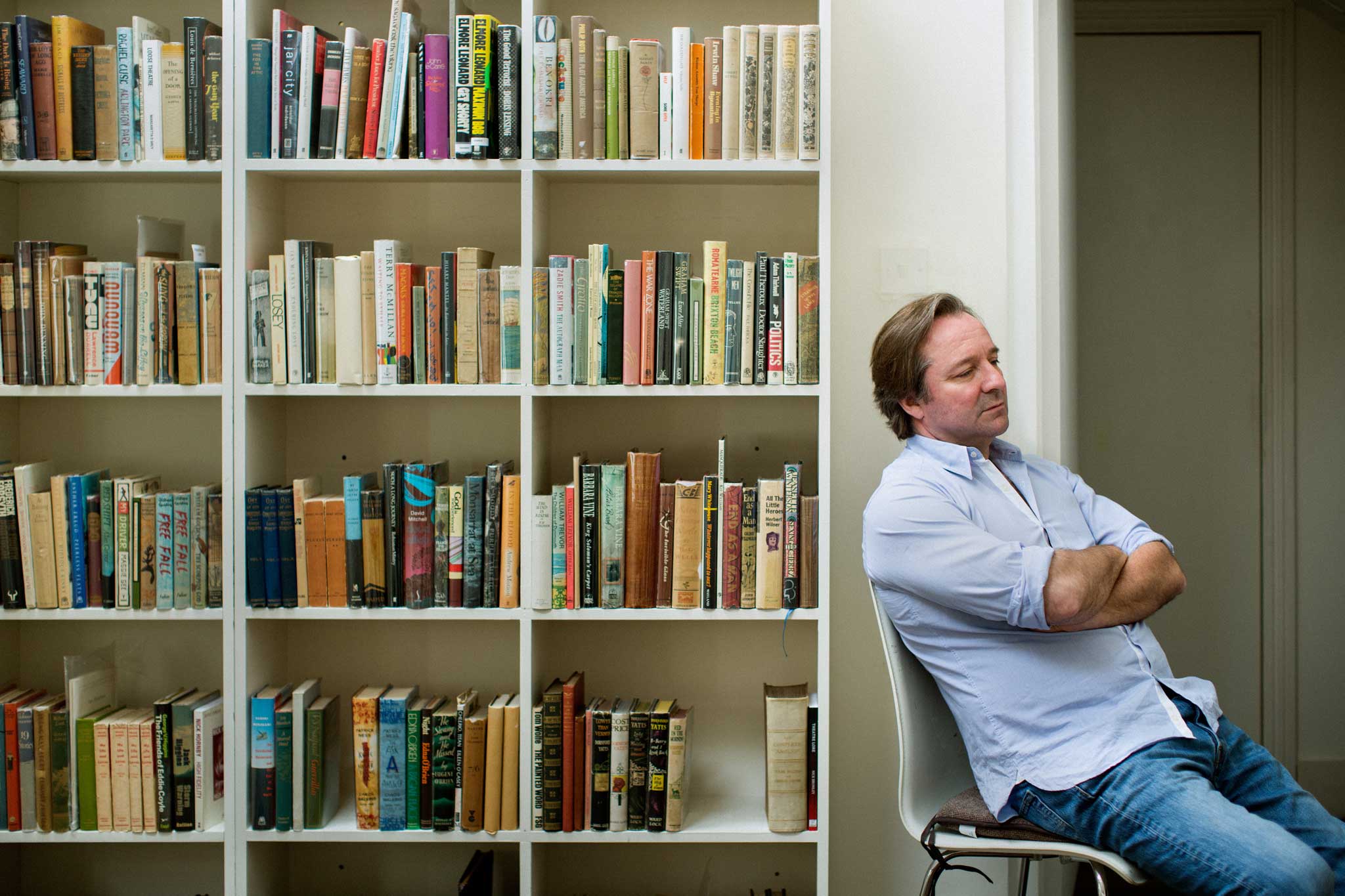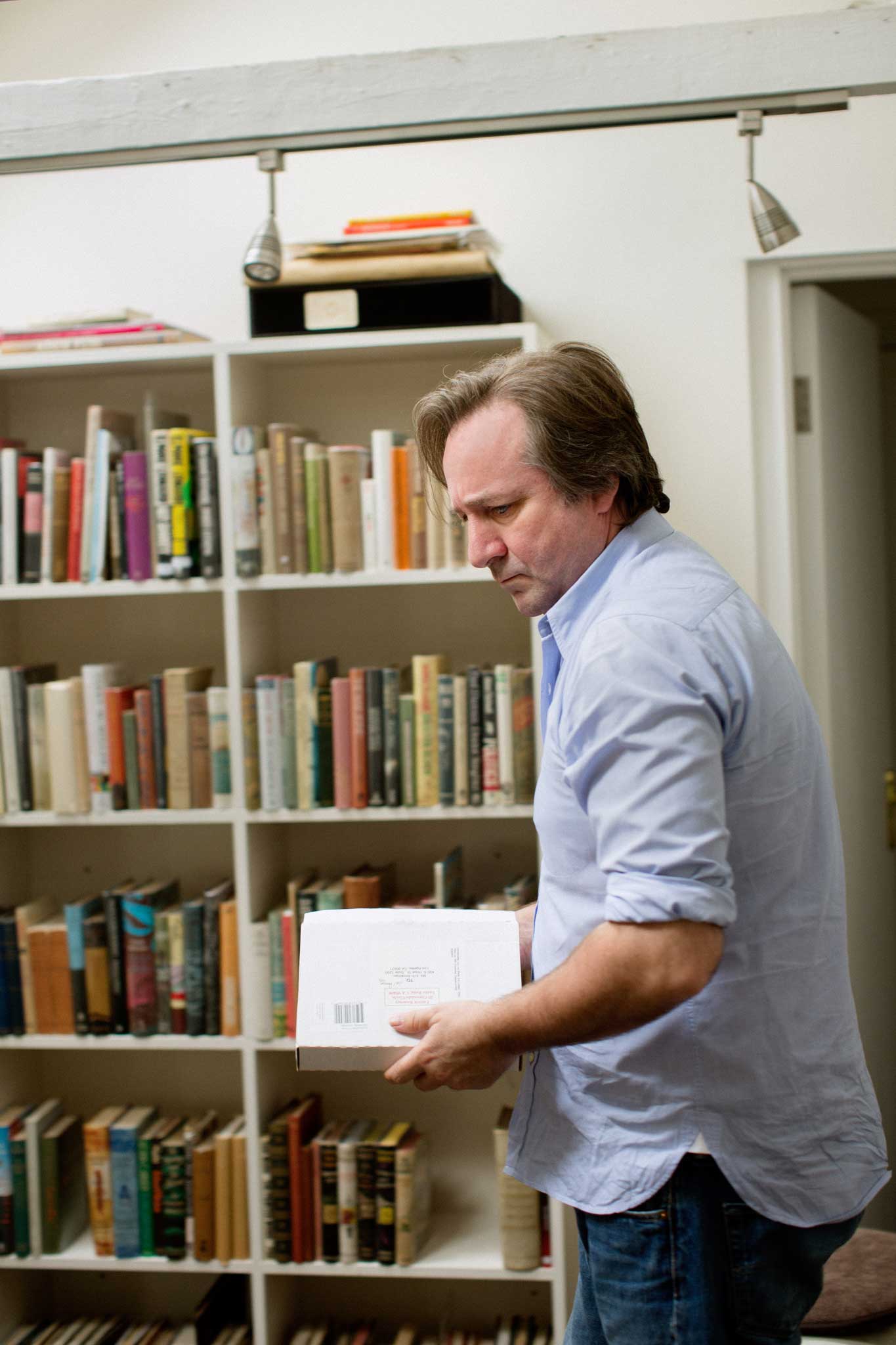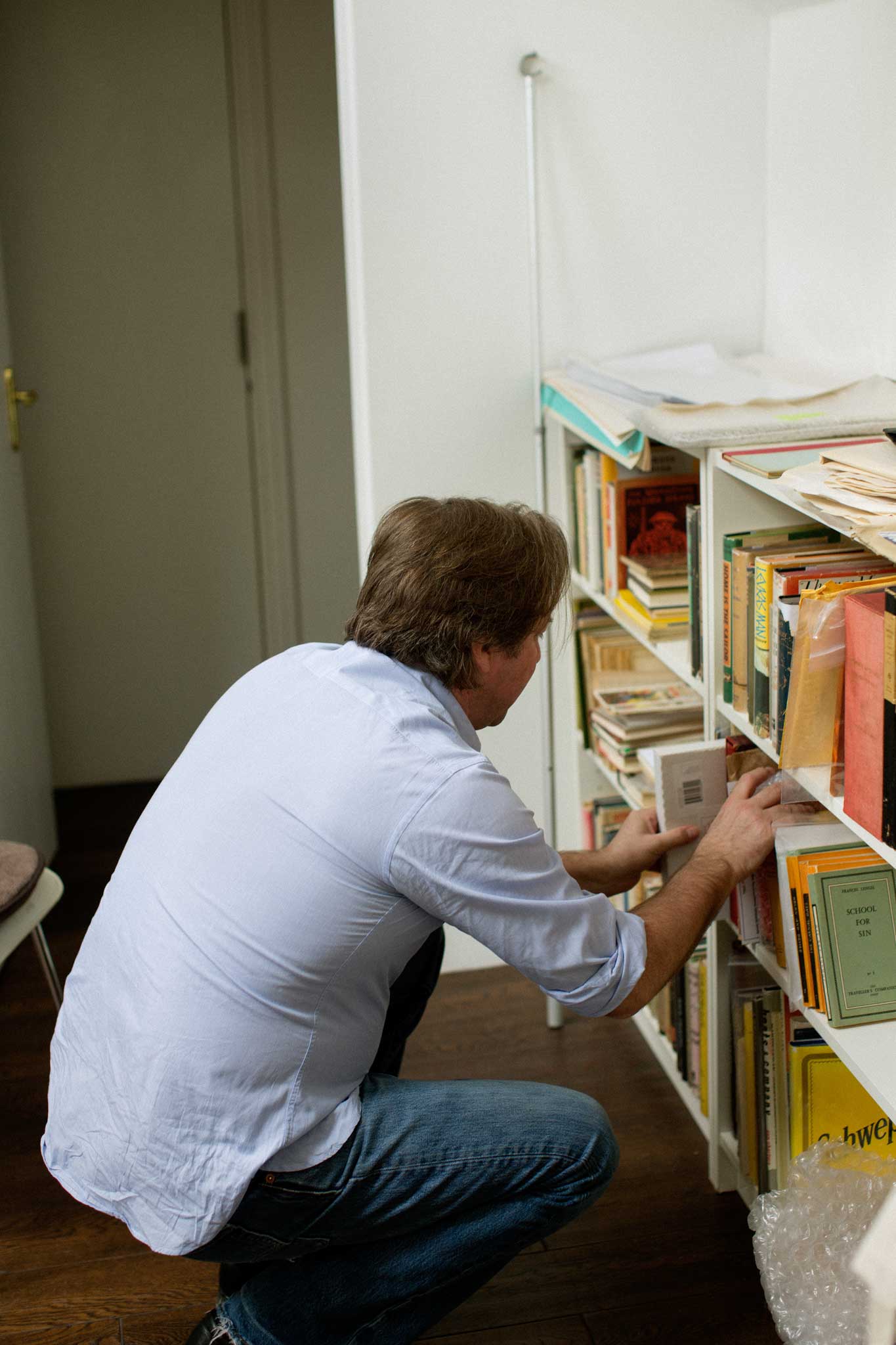Meet Neil Pearson: television star, Hancock resurrectionist - and antique book collector
Neil Pearson is a TV staple. He’s also one of the UK’s top antique book collectors. And when he’s not hunting down Hemingways, he’s bringing Hancock back to life

Your support helps us to tell the story
From reproductive rights to climate change to Big Tech, The Independent is on the ground when the story is developing. Whether it's investigating the financials of Elon Musk's pro-Trump PAC or producing our latest documentary, 'The A Word', which shines a light on the American women fighting for reproductive rights, we know how important it is to parse out the facts from the messaging.
At such a critical moment in US history, we need reporters on the ground. Your donation allows us to keep sending journalists to speak to both sides of the story.
The Independent is trusted by Americans across the entire political spectrum. And unlike many other quality news outlets, we choose not to lock Americans out of our reporting and analysis with paywalls. We believe quality journalism should be available to everyone, paid for by those who can afford it.
Your support makes all the difference.Many visitors to the 2014 London International Antiquarian Book Fair at Kensington Olympia this week may look at the proprietor of Stand F14 and think: "Hang on, isn't that...?" And they'd be right. The handsome chap offering fellow dealers a first edition of The Ginger Man by JP Donleavy for £850, and Aleister Crowley's Amsterdam Notebook for £2,500 is indeed familiar, as the guy who played Dave Charnley the newsroom Romeo in Channel 4's Drop the Dead Donkey, and the priapic Detective Supt Tony Clark in BBC's Between the Lines, and Bridget Jones's TV boss in Bridget Jones's Diary, and Dr Gillespie, the Head of Clinical Services in the medical drama Monroe and, ooh, loads of other things.
Neil Pearson has been a serious collector of books for 30 years. "I don't know why people collect stamps or lead soldiers or vintage cars when they could be buying books," he says. "It's just stupid." His obsession started when he was acting as the young tearaway in Joe Orton's Loot at London's Lyric Theatre and, to relieve the offstage tedium, was reading his way through Anthony Powell's 12-novel sequence A Dance to the Music of Time. In Cecil Court, the rare-books hub of Soho, he spotted a copy of Hearing Secret Harmonies, the final volume, and was startled to discover it cost £30, a significant wedge in 1984. He bought it; it was his first First Edition. He resolved to track down first editions of the other 11 books, and an obsessive collector was born. Gradually, he became a successful book dealer, too: 18 months ago he launched his website, Neil Pearson Rare Books.
This week, he's joining the world's top antiquarian dealers for a three-day book binge. Did it seem odd to people that an actor best known as a Jack-the-lad seducer should display an obsessive lust for old books? The word 'antiquarian' isn't very sexy, is it? "There's nothing odd about it," says Pearson, patiently. "I find books endlessly thrilling, and their histories thrilling. I can't claim to be the young Turk" – his 55th birthday fell last month – "but I'm certainly the new kid on the block. And there are some new funky dealers around, like Sophie Schneideman, Justin Croft, Simon Beattie, Natalie Galustian, who deal in stuff that the crusty end of the market never thought would have a value."
Browsers at Stand F14 will see more than just the predictable copies of literary classics (such as the original Four Quartets by TS Eliot, individually bound in gorgeous autumnal colours) and bookish curiosities, such as the first work by Timothy Leary, the Sixties psychedelia guru. They'll find something seldom seen before: a collection of original radio, film and TV scripts dating back to the 1950s and starring the hot names from steam radio's Olden Days: John Cleese, Michael Palin and Terry Jones from the days before Monty Python, Spike Milligan and the Goons, Ken Dodd, Arthur Askey, Kenneth Horne, Terry-Thomas, Frankie Howerd. Connoisseurs of radio history with several hundred quid to spare can buy original scripts of The Frost Report from 1966, Life with the Lyons, Crackerjack and – the pièce de résistance of Pearson's catalogue – Hancock's Half Hour, starring Tony Hancock, Britain's most popular comedian in the late 1950s.
How did he get his hands on them?
"A lot of stuff came to me from one particular source," he says mysteriously, "a professional comedy writer who, at the end of his every working day, went round the radio or TV studio he was in, gathering up scripts that had been left. No one else thought of doing so, which is why they're scarce. In order to catalogue them properly, I did some research and discovered that some Hancock scripts – about 20 Hancock's Half Hours – were for episodes whose recordings have been lost. When I found out it was the 60th anniversary of the original show (and Galton and Simpson's scriptwriting partnership) this November, I asked the BBC, 'How about it?'."
Pearson's attempt to re-record five Hancock scripts – with himself as co-producer and new actors playing the roles of Tony Hancock, Kenneth Williams, Andrée Melly and Bill Kerr – became a news story. Tickets for the taped recording were snapped up in minutes and the audience packed the BBC Theatre.
Wasn't the 1955 material terribly dated? "I was sure that we'd be reminded that attitudes in those days towards race, women, class, colonialism and homosexuality were quite different," said Pearson. "But we only had to change half a line in five episodes, in case it might seem like a rape joke. We wanted to do the shows just as they were. We didn't want the paramilitary wing of the Hancock Appreciation Society saying, 'What are you doing fucking about with our legend?'."
I attended two recordings at the BBC Theatre. They were still funny and surprisingly surreal. Kevin McNally, best known for portraying a beardy matelot in Pirates of the Caribbean, was freakishly good as Hancock, catching that oh-dear-oh-dear-have-you-gone-raving-mad? voice to a T. "It's eerie how good he is," says Pearson. "I knew he was a mimic and I heard he was a Hancock anorak, so I put two and two together..."

Has he invented a whole new market in vintage scripts? How does he decide what they're worth? "It's an emerging market," he says. "The most paid for any film script was for [Marlon] Brando's personal script of The Godfather – a quarter of a million dollars. With the Hancock stuff, nobody knew what value to give it because it's so scarce. I didn't know how to price it. If I priced it too low, one of the big dealers would buy it all next day. If I priced it too high, nobody would buy anything. Eventually I came up with some prices, people ummed and aahed, and said, 'That seems quite high...' but, after two weeks, they said 'Ah, fuck it'." So he effectively set the market? "Yes, but the market agreed with me. All these scripts went to private collectors." If you want to nip to Olympia and buy a Hancock script, there's a couple going for £850 and £1,250.
Pearson was born in 1959 in Battersea, then a more working-class milieu than it's become. His father John, a panel-beater, left home when Neil was five, and he was brought up – the eldest of three siblings – by his mother, the daughter of a local greengrocer. He is very protective about his mother. "People called it a broken home, but it wasn't – it would have been a lot more broken had there been two parents." A confident child with an exhibitionist streak, he performed "Frère Jacques" before an audience on Clapham Common grandstand, aged five, and won a book. He devoured the Jennings and Darbishire books by Anthony Buckeridge at 10, "and I wanted to go to a boarding school because it sounded fun". His mother discovered a state-run boarding school in Suffolk called Woolverstone Hall, a former stately home which took 80 per cent of its boys from single-parent families. He enjoyed himself there and started acting, playing Ariel in The Tempest and Thomas More in A Man For All Seasons. ("Neil was good, but he was self-conscious," recalled his housemaster.)
Just as an actor tries to get inside the psychology and the back-story of the character he plays, Pearson likes to explore the human angle behind the books that pass through his hands. He rhapsodises about a collection he once owned of the original instalments of Dickens's Bleak House: 20 thin magazines, bound with illustrations and advertisements for Sangster's parasols or Milton's chamomile pills. "Before these original part-works, Bleak House didn't exist except in Dickens's imagination," he says excitedly. "But by then he was a big star, so everyone wanted to advertise their collar-stiffeners and bustle-straighteners alongside. There's no 'first edition' of these instalments, because they were printed in great numbers and sold in railway stations and bus depots. And villages bought them so that the person in the village who could read would read aloud to the others. I find that stuff fascinating."

Pearson has held in his hand a copy of Ernest Hemingway's near-priceless first book, Three Stories and Ten Poems. (Coincidentally, Johnny Depp recently spent £125,000 on a copy of Hemingway's In Our Time story collection for his fiancée Amber Heard – who said rare books weren't sexy?) He talks in hushed tones about the importance of finding The Great Gatsby in a dust jacket. "It was the practice of readers until the 1960s to see the dust jacket as shop dressing. When they got home, it pains me to say, they'd take off the jacket and throw it away, and the gilt would look nice and bright on their shelf. Now a Gatsby first without dust jacket is worth £1,500. With a dust jacket, it's £100,000."
It's hard to tear oneself away from Mr Pearson, who will happily talk books all day. He showed me a letter from Samuel Beckett, unsubtly applying to a literary agent for work; and a note from Coleridge to a surgeon suggesting they should together find a cure for his opium addiction; he showed me a copy of the clean-up-TV campaigner Mary Whitehouse's autobiography, inscribed to Bob Holness, presenter of Blockbusters. He showed me prize examples from his collection of early gay literature, "joyous examinations of the gay lifestyle, in which nobody dies or gets punched or comes to a sticky end, so to speak" and his sweat-inducing volumes of high-class erotica.
I've seldom met a man so delightedly absorbed by what, to some people, is a mere hobby. And, he insists, it's not about the investment potential. "For hardly more than the price of a hardback, you can start putting together a collection that's uniquely yours. You're paying for the privilege of looking after these things for a couple of generations while time decides what's worth keeping – and that's a lovely thing to do".
The London International Antiquarian Book Fair runs from Thursday to Saturday at Kensington Olympia, London. The new 'Hancock's Half Hour' will air later this year on Radio 4
Join our commenting forum
Join thought-provoking conversations, follow other Independent readers and see their replies
Comments